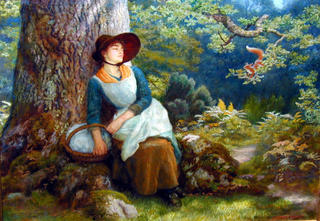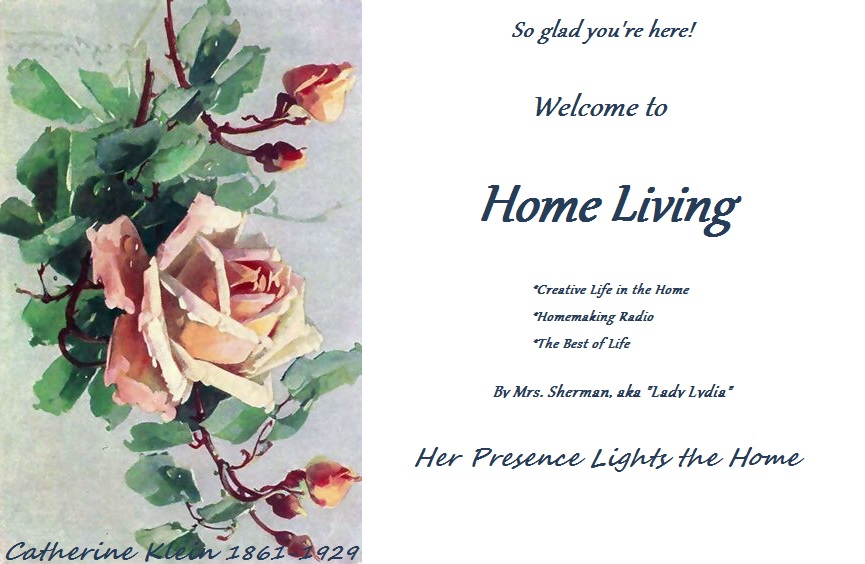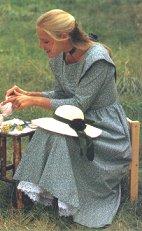
Like most people, our lives have been a series of successes and setbacks. We just seem to get what we need, and where we want to be in life, and a new challenge comes along that uses up our resouces. We've gone from "car city" to a one-car family. As "Pa" said often in Little House on the Prairee, "No setback is without a small blessing, " (or something like that).
Since I'm the one that uses the car the least, I'm also the one who spends several days a week in isolation. I'm not alone in a neighborhoood, either; I'm far away from stores and friends. About 5 hours into the day on one of these "alone" days, I called my daughter, Lillibeth, and told her it was getting a little tiring being alone and that not one car had even driven by on the road to town. She replied, "Well, mother, you are always trying to research the Pioneers. All you have to do is pretend you are in Pioneer Days, when they spent so much time alone on the prairees. You can identify with them."
That perked me up for a few more hours, and I began to imagine all sorts of things. About three hours later, knowing I had yet another 6 hours before anyone came home (I'd given up trying to invite people over--just about everyone I knew was occupied or didnt' answer their phones--does anyone stay home these days???)--I called her again, and said rather darkly,
"I've about had enough of this 'Pioneer Stuff"The Pioneer, Civil War, or Elizabethan reenactments are great, but they are usually with a great crowd of people--in real life in those days, women spent many days alone. I'd like to challenge anyone who feels they have overloaded their minds and bodies with activities, to have a day alone, and catalog their emotions during this time. Although it might not be possible to be left completely alone in the woods, as many people have home duties and children about, just get as alone as you can.
When the "crunch time" comes where you think you can't stand it anymore and you want to scream, you aren't allowed to turn on the television or put in a movie; you can't call a friend unless it is for the purpose of sending out encouragement (you aren't allowed to complain.)
Famous stressed-out people spend thousands of dollars to go to monastaries to give their minds a rest. At home, it costs you nothing.
I found it interesting that after an intense period of anxiety and withdrawal symptoms,which I thought I would not survive, I was surprised when I came out of it into a kind of "light" with a clearer mind and a more active imagination, as well as a creative urge.
When I again met with "people," some of them said that I had "changed" and that being around me made them feel consolate and reassured, less nervous and wacked out about everything. When I had an overload of socialization, I felt I didn't like people as much!
I seem to be on this anit-socialization kick, not because I don't like people, but because I think we've been programmed from a very young age, for the wrong kind of socialization. We were gotten up and sent to school first thing in the morning to be with people we were forced to socialize with. After school was completed, we did the same thing, only we went to work to be with people we had not personally made friends with, either, and whom we were forced, once again to socialize with daily.
One of the reason people feel restless at home is because of the amount of socialization they partake in. Almost from the beginning of their lives, they are trained to get up in the morning and go somewhere else. If you want to get used to staying home, it takes awhile to get over the addiction of socialization and focus on the tasks at hand.
I was discussing this concept with someone, who replied, "Yes, but there are just some people who can't be alone." I think it is more likely that they've been conditioned not to be alone, and that they could be conditioned, by practice, to prefer more alone time. Some of us are indeed more sociable than others, that is a fact. What I am talking about is the value and the necessity of the human being being alone. We see time and time again throughout the Bible the people who spent time alone and the benefits of it.
One day alone can show a person how much needs to be done at home, or in self-improvement. When I was a teenager I attended a class for young ladies, in which we were given a "self-improvement" test. It contained a list of character qualities, both good and bad, (promptness, criticalness, cooperativeness, discernment, etc.) and we were supposed to write down the things we lacked in our lives, and then do a report on the word, such as "perseverance" or "endurance."
One day alone can help bring about some of this needed introspection, not to mention a chance to look around at the home and see things that need to be done. In a constant whirl of social activities, these things cannot be achieved. People that get too wrapped up in coming and going, can actually become afraid of being still, because they will have thoughts that come into their minds, that may be uncomfortable. Being alone means you have to face yourself and your God but it is essential if you want to have a healthy mind.
The one day alone is a perfect time to catch up on letters. After you really get in to writing letters, it casts the mind into a completely different realm. Anytime we serve others or get outside of ourselves and our problems, our minds become more balanced. Contrast this to what the worldly counsellors tell you: get inside of yourself and dwell on your problems. Today, those that practice that are still debilitated by their problems, and not living victorious lives. "After all, I'm only human," they say. Consider what an insulting remark this is. God created humankind in His image, as the Bible says, and we say, "after all I'm ONLY human?"
One day alone....let's try it.
















